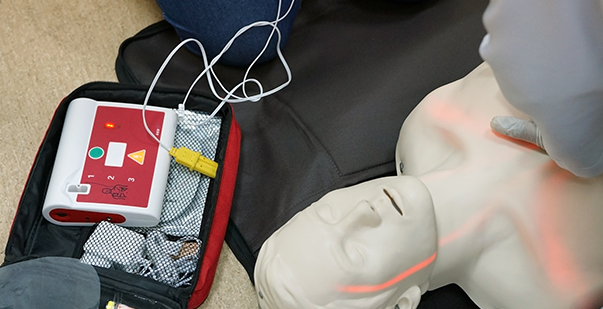Every education course gets frequent updates to ensure learners stay caught up. The latest ACLS guidelines also discuss better ways to save lives during a cardiac emergency. In this blog, you will read about the critical updates to the ACLS guidance. You can also gain a clear understanding of why ACLS is a vital course and, indeed, why heart-care guideline updates are crucial.
Master ACLS Now
Get ACLS certified with confidence
Critical ACLS Updates: What You Need to Know in 2023?
All life-saving course materials are constantly updated as technology finds better ways to treat people. The latest updates to the ACLS guidelines came in October 2020. These updates include new recommendations for using automated external defibrillators (AEDs). You also learn about the administration of medications and the management of cardiac arrest. Here are some of the critical updates to ACLS in 2023:
- The use of AEDs: All healthcare providers and lay rescuers trained in Cardiopulmonary Resuscitation CPR should use AEDs, particularly vital in cases of ventricular fibrillation as soon as possible during an out-of-hospital cardiac arrest (OHCA).
- . Automated External Defibrillators (AEDs) can deliver a life-saving shock to the heart even if the person is not breathing or has no pulse.
- The administration of medications: The new guidelines suggest delaying epinephrine (adrenaline) until after chest compressions have begun. Administering epinephrine before chest compressions can be harmful.
- Managing cardiac arrest: The new guideline updates recommend that healthcare providers focus on continuous chest compressions and early defibrillation. Chest compressions and defibrillation are the most effective ways to save lives in cardiac arrest.
These are just some of the vital updates to ACLS in 2023. If you are a healthcare provider or layperson trained in high-quality CPR, you must be familiar with these updates to provide the best possible care to someone in cardiac arrest.
Read More: Acls promo code
What makes an ACLS skill important?
Advanced Cardiovascular Life Support (ACLS) skills are essential because they can save lives.
ACLS skills include:
- Cardiopulmonary Compressions: The application of chest compressions serves to circulate blood actively, maintaining vital blood pressure to sustain cerebral and organ perfusion.
- Respiratory Resuscitation: Administering rescue breaths becomes imperative to supply crucial oxygen to the lungs when spontaneous breathing ceases, ensuring an essential element of life support.
- Automated External Defibrillation (AED): Utilizing automated external defibrillators (AEDs) is crucial in delivering a life-saving shock to re-establish cardiac rhythm during cardiac arrest, leading to improved outcomes.
- Pharmacological Intervention: The judicious administration of medications plays a critical role in stabilizing cardiac function during episodes of cardiac arrest, showcasing a nuanced approach grounded in medical expertise.
ACLS skills are essential because they can allow a person to survive cardiac arrest. Studies have shown that early CPR and defibrillation revive a person faster from cardiac arrest.
Here are some of the reasons why ACLS skills are essential:
- They can save lives. Early CPR and defibrillation can double or triple the chances of survival from cardiac arrest.
- They are relatively easy to learn. The basic principles of CPR can be learned in a short amount of time.
- Anyone can use them. CPR and the use of AEDs do not require any special medical training. Even though this is an advanced skill, it is easy to learn and practice.
- ACLS skills are essential for healthcare providers. Healthcare providers not certified in ACLS are not considered competent to care for cardiac arrest patients.
Read More: ACLS Certification in North Dakota
Cardiac Care: Staying Current in Life-Saving Techniques
Cardiac care is a broad term encompassing heart disease prevention, diagnosis, and treatment. Continuous research developments are rapidly improving the care of patients with heart disease.
One of the most important aspects of cardiac care is staying current with life-saving techniques. It includes knowing the latest guidelines for CPR, using AEDs, and administering medications. It also includes being familiar with new technologies and procedures to improve the care of patients with heart disease.
There are several ways to stay current in life-saving techniques in cardiac care. One way is to attend training courses. There are many training courses available, both online and in person. These courses typically cover the latest guidelines and techniques for CPR, the use of AEDs, and the administration of medications.
Another way to stay current on life-saving techniques is to read medical journals and articles. Many medical journals publish articles on the latest research in cardiac care. These articles can provide information on new methods to revive a person faster from cardiac arrest.
Conclusion
It is important to remember that ACLS skills are not a substitute for medical care. If you see someone who is in cardiac arrest, you should call 911 immediately. However, knowing ACLS skills can help you save a life until help arrives. Check out the Advanced Cardiovascular Life Support Now website to learn more about the latest ACLS guidelines and skills. We offer seamless courses on basic life support (bls) and advanced life-saving skills. Register today for exclusive offers and group discounts.
Facebook







